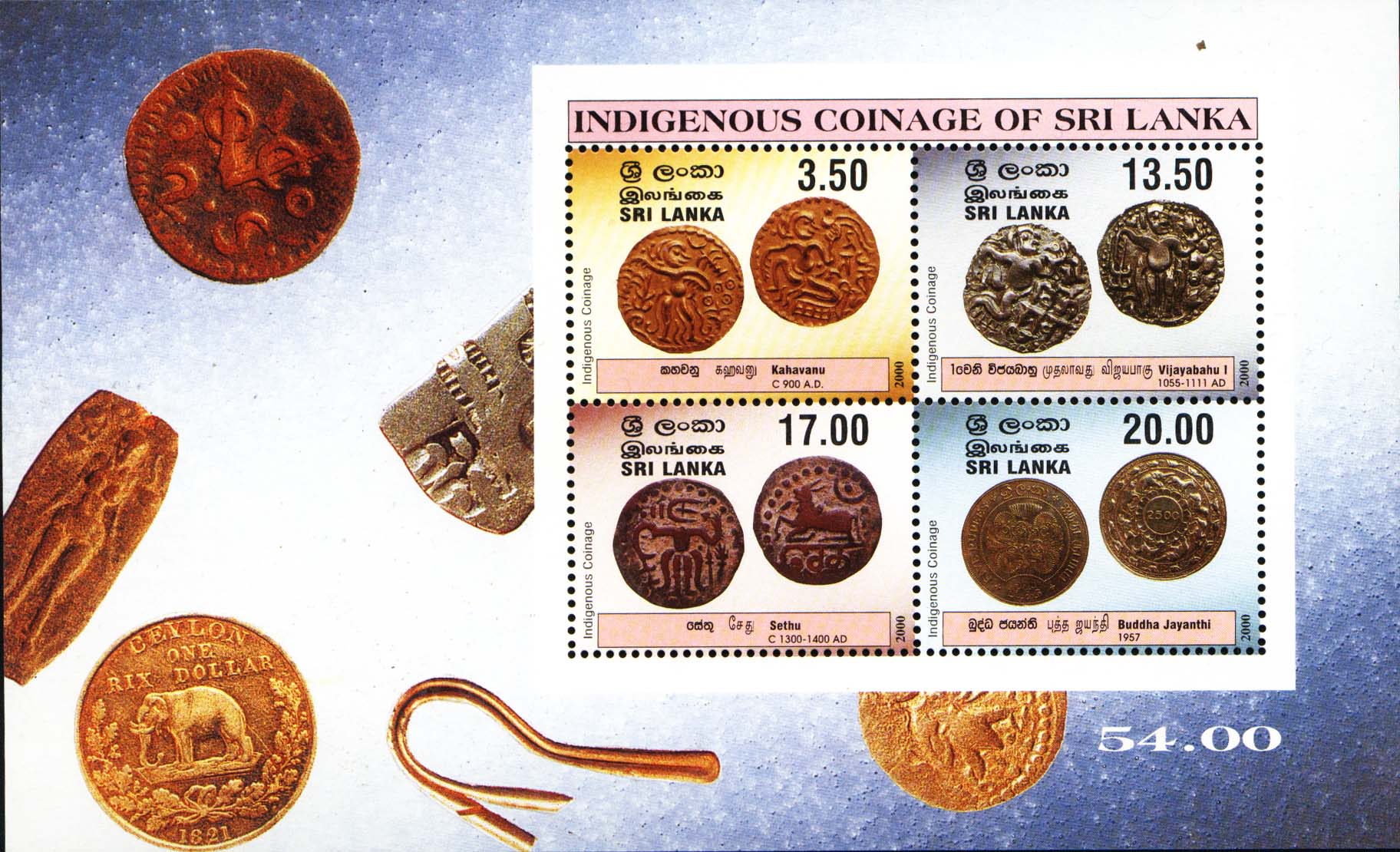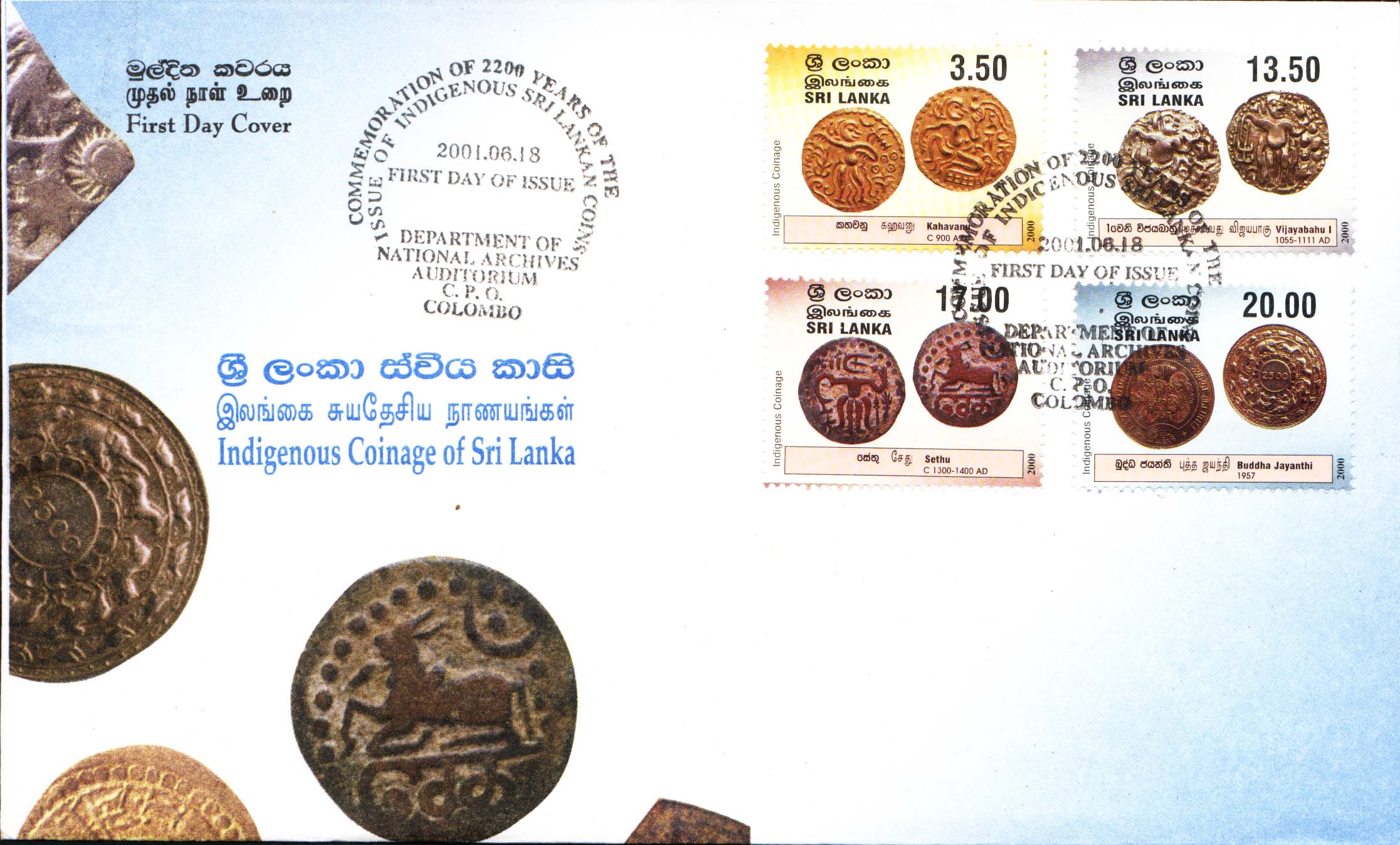| Stamp Bulletin No. 482
| Commemorative Issue |
Indigenous Coinage of Sri Lanka
2001.06.18
Philatelic Bureau
Department of Posts,
Transworks House, Colombo 00100, Sri Lanka
The Philatelic Bureau of the Department of Posts issued
four new stamps in the denominations of Rs. 3.50, Rs. 13.50,
Rs. 17.00 and Rs. 20.00, and a Miniature Sheet on 18th June,
2001 to commemorate 2,200 years of the issue of indigenous
Lankan coins.
The stratigraphic dating of coins in archaeological excavations
in Anuradhapura in the past few years has assisted in the dating
of most of the pre-Christian indigenous as well as other coins
used in Lanka. The elephant with symbols and railed
swastika (peculiar to Lanka) have been dated to circa 200
B.C. Similar coins with the "railed" swastika, the lion, goddess
Lakshmi, a tree with enclosure and a horse are common to this
period. The earliest non-indigenous coins used extensively in
Lanka are the Indian Janapada series punch-marked coins.
They are dated in India to the 5th century BCE. The Mahvansa
commonly refers to the coins of this period as Kahapana.
The Lankan coinage continues through periods of
invasion. Indigenous coins, as well as Pandyan, Chola and Chera,
other coins from the Indian sub continent, Roman, Kushan,
Chinese and Mohammedan to name a few, are commonly
found. With the occupation of Lanka by the Portuguese,
Dutch and British, the coinage continues as a combination of
their respective coinages, as well as indigenous issues. The post
independence (1948) coinage continues as a purely indigenous
series.
| Rs. 3.50:
Kahavanu 9th, century CE, the oldest Lankan coin
inscribed in Nagari and struck in gold has the legend Sri Lanka
Vibhu. This coin
is popularly referred to as the Kahavanu. The
coin illustrated being of the Kalanda weight category of the type
I Sun and Moon variety weighing 4.45g. and 20mm. in diameter.
They were issued in the weight categories of a Kalanda, half (ada
Kahavanu), quarter (De-aka), one eighth (aka) and one sixteenth
(masaka). The three types are Type I, II, III which vary
distinctly. The obverse and reverse of the coin depicts a
stylized human figure in standing and seated positions.
|
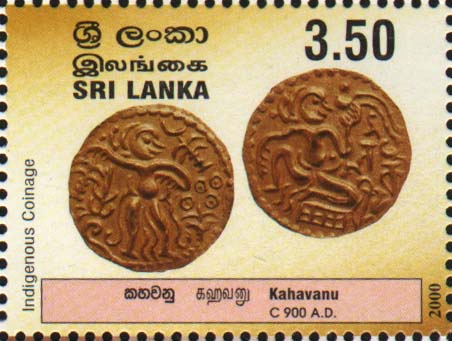
|
|
Rs. 13.50:
Vijayabahu I 1055-1110 CE. The first Lankan King to
issue any coin with his name inscribed in Nagari script was
Vijayabahu I; subsequent Kings bearing the same name issued
coins with the same legend. His
coin,
however, features a
distinct difference in the Sri in the legend inscribed in four
lines-Sri-Vi-ja-ya-ba-hu. This form of the Sri is only used
by one other king Parakramabahu I, 1153-1186 CE The coin
illustrated is in silver weighing 4.26g. and 2l.5mm. in diameter.
|
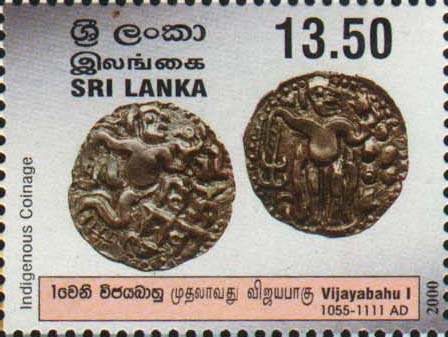
|
|
Rs. 17.00:
Sethu. These
coins
with a couchant bull with trappings
and legend Sethu are generally attributed to the Arya
Chakravarthi's of Jaffna. The seated bull is always surmounted
by a crescent with a dot signifying the sun and moon and the
auspicious Tamil legend Sethu below. These coins can be
attributed to the 13th and 14th centuries CE at the earliest. The
coin illustrated is of copper, 3.87g in weight and 20mm in
diameter.
|
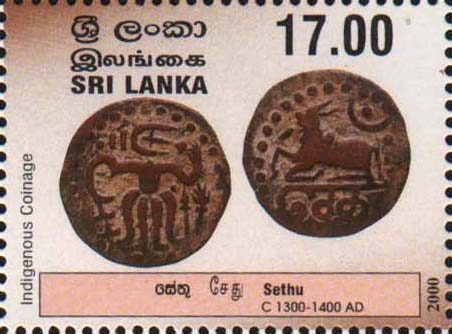
|
|
Rs.20.00:
Buddha Jayanthi Five Rupees. The first commemorative
coin
issued by Sri Lanka since independence (1948) was in April
1957. It commemorated the 2500th anniversary of Buddhism.
It became the first Sri Lankan "Crown" size issue (of interest
of worldwide collectors). The coin illustrated is 0.925 fine silver
with a weight of 28.22g and 38.74mm in diameter. The
design has an adaptation of the Anuradhapura Moonstone and
a jasmine flower, surmounted by a lotus flower. The jasmine
flower and the lotus are retained through our indigenous coinage
in various forms from the earliest swastika coins dating from
circa 200 BC.
|

|
The illustrations and narrative have been provided by
retired Wing Commander Rajah Wickremesinha, a very senior
Lankan numismatist, a Fellow of the Royal Numismatic
Society, member of the Oriental Numismatic Society, London
and a life member of the Sri Lanka Numismatic Society.
Technical Details
| Date of Issue | 18th June, 2001
|
| Denominations | Rs. 3.50, Rs.13.50, Rs.17.00, Rs. 20.00
|
| Designer | Pulasthi Ediriweera
|
| Format | Horizontal
|
| Stamp Size | 38mm x 28mm.
|
| Printing Process | Offset Lithography
|
| Printers | Security Printers, Malaysia
|
| Sheet Composition | 100 stamps per sheet
|
| Colours (used) | 4 process colours
|
| Gum | Particle gum
|
| Paper | 102 gsm. security postage stamp paper
|
| Perforations | 14
|
| Quantity Printed | 1,000,000 each
|
| Miniature Sheets | 30,000 - Rs. 54.00 each
|
| Miniature Sheet size | 90mm x 150mm
|
